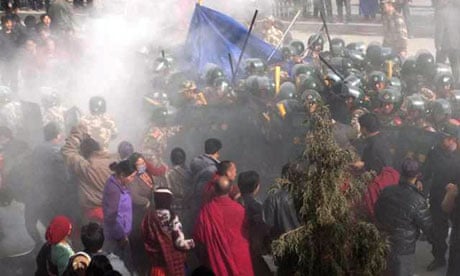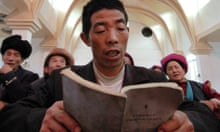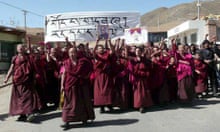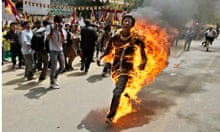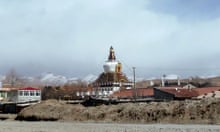Chinese authorities have accused a Tibetan man of murdering his wife, in response to reports that she self-immolated in protest at Beijing's policies.
An exile group and Radio Free Asia had reported that 30-year-old Kunchok Wangmo set fire to herself on 13 March on the main street of Ruoergai county town in Aba county, Sichuan province.
More than 100 monks, nuns and lay people have self-immolated in the last two years in predominantly Tibetan areas across western China. Aba, known to Tibetans as Ngaba, has recorded more than 30 such cases. Local authorities there revealed recently they had cut off the internet and text messaging, and tightened control over the sale of petrol and painkillers in their attempts to halt the protests.
Exile groups said police seized and cremated Kunchok Wangmo's body and handed her husband Dolma Kyab the ashes. They detained him only after he refused to blame the self-immolation on domestic problems.
Dzoge Lekshek, an exile with contacts in the region, told Radio Free Asia: "The authorities wanted Dolma Kyab to declare that she burnt herself as a result of a family conflict and when he refused to comply, he was detained and taken away."
The English-language edition of state newspaper Global Times reported on Tuesday that police were holding him cla because he had strangled his wife and then burned her body.
Aba prefecture spokesman Jiang Zuquan told the newspaper he was certain the case was not a protest against Chinese policy in Tibetan areas. He alleged Dolma Kyab strangled his wife at their home after a row about his alleged alcoholism, before moving her body to a nearby building and setting fire to it.
Repeated phone calls to the propaganda office went unanswered.
Alistair Currie, spokesman for the Free Tibet campaign, said it was seeking further information but remained sceptical about police claims.
"We have no reason to trust Chinese authorities and experience shows they are actively seeking to denigrate those who conduct these protests … This would fit in with that," he said.
"No one can have any faith in the legal system in Tibet and the only way to ensure a full and accurate account would be if international observers were given free access to the area and allowed to perform an investigation. China has consistently refused to allow any such external involvement, despite repeated requests from governments and the UN."
Chinese authorities have jailed people for "encouraging" self-immolations in recent months and have detained many more.
The Chinese Human Rights Defenders group reported last week that a senior monk from Qinghai province, known only as Yarphel, had been jailed for 15 months for "disrupting traffic" and "disrupting public order" after he carried the ashes of a nephew who had self-immolated in a procession from a monastery to his nephew's home last year.
The Global Times recently revealed that officials in Xiahe, Gansu province, have required residents to sign letters of commitment against self-immolation following cases there.
"The families of self-immolators can't keep the bodies, residents are forbidden to offer condolences, and monks are not allowed to chant sutras for the dead," added Bai Weilong, a government worker.
In Hezuo, Gannan prefecture, in the same province, the chief of a township told the newspaper it had driven out 16 monks from its monastery who "misbehaved or violated monastery rules", following the self-immolation of a villager.
Separately, Chinese authorities confirmed that a Tibetan monk from Kirti monastery in Aba burned himself to death there on Saturday. Lobsang Thokmey was 28.
Radio Free Asia said he had wanted to mark the fifth anniversary of a Chinese crackdown on the 2008 Tibetan protests in the area.
The Chinese government has blamed followers of the Dalai Lama for the self-immolations. They accuse the exiled spiritual leader of seeking to split Tibet from the rest of China.
He says he seeks only meaningful autonomy for Tibet and has blamed the burnings on discontent at the way China rules the region.
